Managing inventory across multiple Shopify stores can be overwhelming. But with the right tools, you can save time, reduce errors, and improve stock accuracy. This article highlights five tools designed specifically for Shopify brands managing multiple locations. Here's what you need to know:
- Forstock: AI-powered forecasting, real-time syncing, automated purchase orders, and robust analytics for $39/month.
- Multi-Store Sync Power: Affordable syncing tool ($19–$49/month) with two-way updates and basic automation.
- SKULabs: Comprehensive inventory and order management for $299/month, ideal for large-scale operations.
- Prediko Inventory Management: AI-driven forecasts, bulk editing, and customizable reports starting at $49/month.
- Syncio Multi Store Sync: Real-time inventory syncing with free and paid plans, great for basic needs.
Quick Comparison:
| Tool | AI Forecasting | Real-Time Syncing | Automation | Purchase Orders | Reporting & Analytics | Price |
|---|---|---|---|---|---|---|
| Forstock | Yes | Yes | Yes | Yes | Advanced | $39/month |
| Multi-Store Sync Power | No | Yes (Two-way) | Yes | Limited | Basic Sync Logs | $19–$49/month |
| SKULabs | Basic | Yes | Yes | Yes | Comprehensive | $299/month |
| Prediko | Yes | Yes | Yes | Yes | Highly Customizable | $49+/month |
| Syncio | No | Yes (Two-way) | Yes | Limited | Basic Logs | Free & Paid |
Each tool offers unique strengths, so your choice should depend on your needs, budget, and business size. Forstock stands out for its affordability and advanced features, while SKULabs suits larger enterprises. Test free trials to find the best fit for your operations.
Top Inventory Management Apps for Shopify

1. Forstock
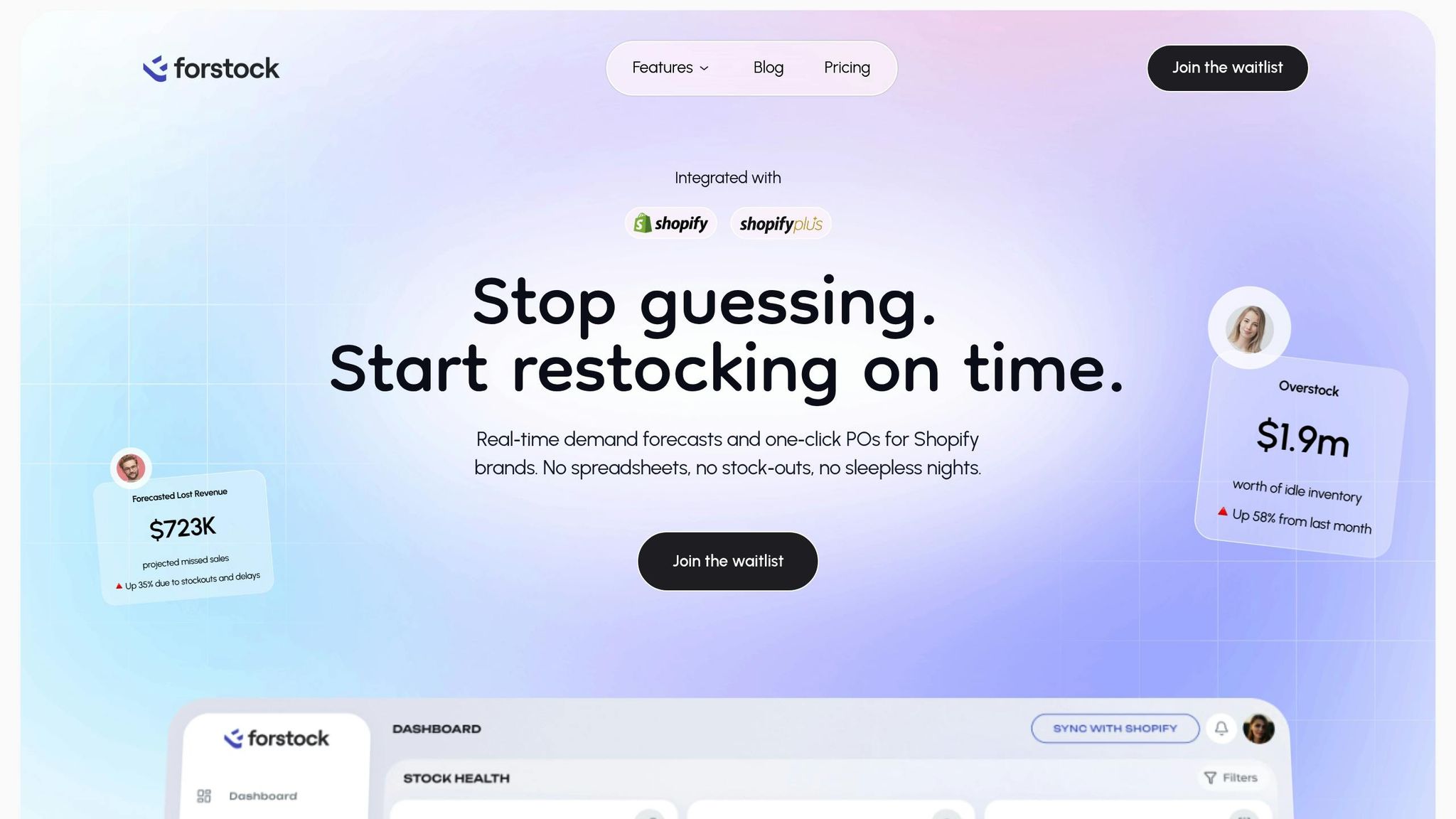
Forstock is an inventory management platform tailored for Shopify brands managing multiple store locations. Designed to simplify operations, it uses AI to turn complex inventory challenges into a smooth, data-driven process. Here's a closer look at what makes it stand out.
Multi-store/location support
Forstock's unified dashboard acts as a central hub for managing inventory across multiple Shopify stores or physical locations. It consolidates all inventory data, giving merchants a clear view of stock levels, performance metrics, and supplier coordination - all in one place.
Whether you're juggling a few boutique shops or scaling up to dozens of locations, Forstock handles everything from simple SKUs to complex multi-variant catalogs. It grows with your business, keeping operations manageable no matter how many stores you add.
Real-time syncing
Forstock integrates seamlessly with Shopify, offering real-time inventory synchronization across all connected stores and locations. This means stock levels, sales, and purchase orders update instantly, reducing the risk of overselling or running out of stock.
This feature is especially useful for fast-moving brands or those with frequent inventory changes. If a popular item sells out in one location, the updated availability is reflected across all stores immediately, ensuring customers aren't left disappointed.
Automation features
Forstock takes the hassle out of inventory management with its automation tools. It automatically generates purchase orders when stock dips below set thresholds, using AI to analyze sales trends and predict future demand. Once generated, the system notifies suppliers without requiring manual input.
Routine tasks like supplier communication and stock replenishment scheduling are also automated. Users can create, split, and track purchase orders in minutes, sync them with Shopify, record payments, and manage receipts - all through a streamlined workflow.
The platform’s smart assistant, Alfred AI, offers instant insights and suggestions based on your inventory data. Whether you’re looking at sales trends or supplier performance, Alfred helps you make faster, more informed decisions.
Demand forecasting capability
Forstock’s AI-driven forecasting models analyze historical sales, seasonal trends, and lead times to predict future demand. This allows merchants to plan up to 12 months ahead, aligning inventory purchases with customer needs.
By continuously adapting to changing sales patterns, the forecasting tool helps businesses avoid overstocking, which ties up cash, or stockouts, which result in lost revenue. It pinpoints exactly what needs reordering and when, ensuring best-sellers stay in stock while reducing excess inventory.
Purchase order management
Managing purchase orders is effortless with Forstock. Through its centralized dashboard, users can create, track, and manage POs with ease. The platform can even generate POs automatically based on demand forecasts or low-stock alerts.
Forstock also keeps detailed logs of supplier communications and performance metrics, making vendor coordination and negotiations straightforward.
"With Forstock, we can create POs in minutes, track supplier performance, and forecast demand without the guesswork. It is the first tool that actually bridges inventory management and purchasing instead of forcing us to hack things together." - Daniel, Supply Chain Manager
Reporting & analytics
Forstock provides robust inventory analytics through real-time dashboards and customizable reports. Merchants can track stock turnover rates, supplier performance, and demand trends across locations, helping them optimize inventory strategies.
Detailed sales reports and performance metrics make it easier to identify slow-moving products, fine-tune reorder points, and improve overall efficiency. These insights give brands a clearer picture of their operations, enabling smarter, data-backed decisions.
Ease of integration with Shopify
Getting started with Forstock is simple. The platform offers a guided onboarding process to connect your Shopify account, set up store locations, and configure inventory rules. Its intuitive design makes it easy to use, even for team members without technical expertise.
Once integrated, Forstock syncs listings, orders, and inventory across your catalog, creating a smooth flow of data between Shopify and its advanced inventory tools.
Pricing structure
Forstock keeps pricing straightforward with a flat rate of $39 per month, regardless of business size. This plan covers startups with under $250,000 in annual revenue as well as larger businesses generating over $40 million.
Every subscription includes the full suite of features: dashboard analytics, inventory intelligence, reorder suggestions, purchase order management, and supplier tools. Plus, all plans come with a 14-day free trial and live chat support, so you can test the platform without any commitment.
This flat-rate approach eliminates the stress of tiered pricing and ensures growing brands can expand without worrying about unexpected cost jumps.
2. Multi-Store Sync Power
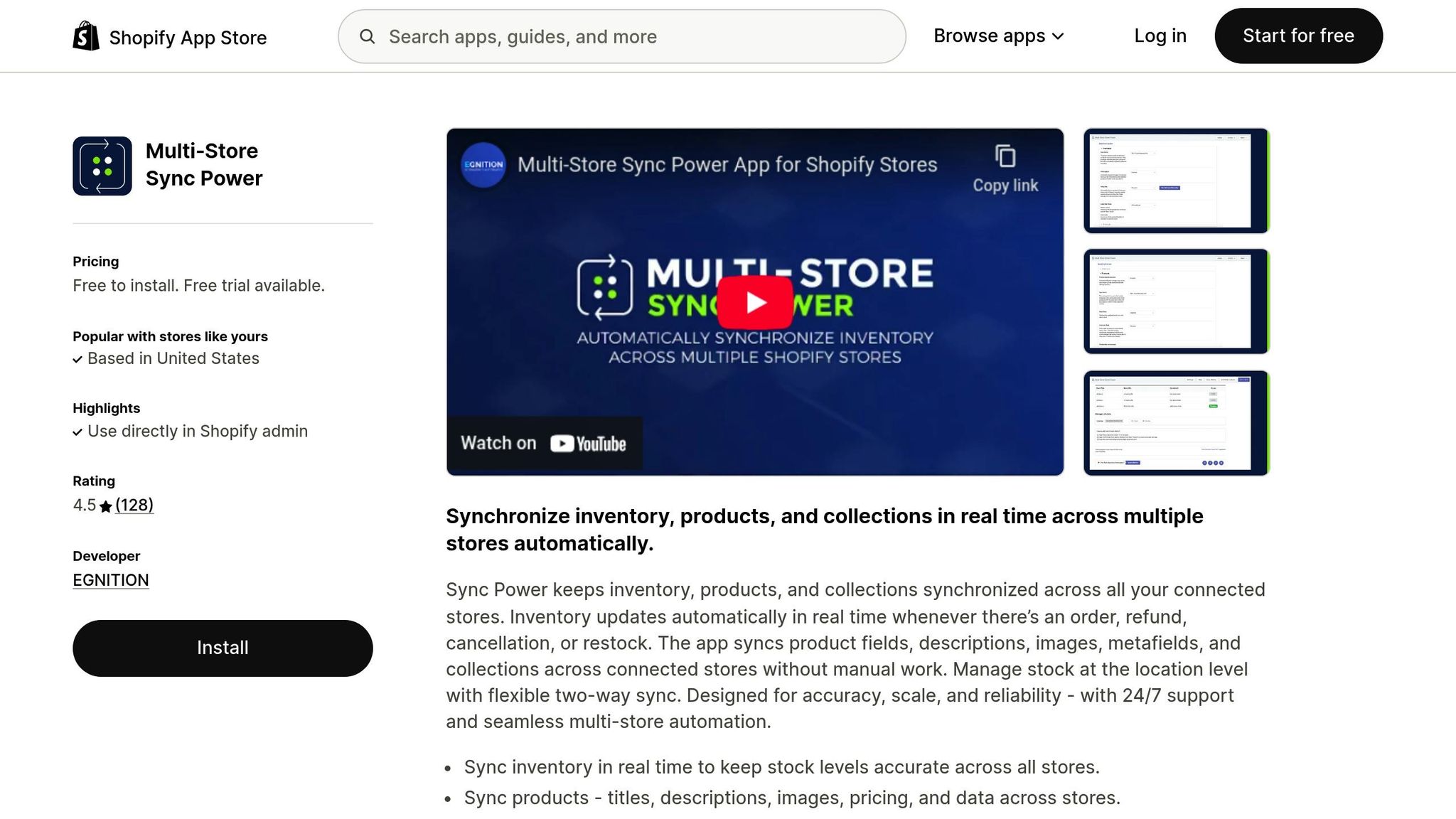
Multi-Store Sync Power by EGNITION simplifies inventory and product management across multiple Shopify stores by syncing everything automatically - no more manual updates. Let’s dive into its features and how it supports growing businesses.
Multi-Store/Location Support
This app centralizes inventory and product management by syncing stock levels, product details, and collections across all locations. It’s designed to scale with brands operating multiple stores or planning to expand. Whether you’re juggling several sales channels or managing a complex inventory, this tool ensures everything stays in sync effortlessly.
Real-Time Syncing
Multi-Store Sync Power offers automatic, two-way syncing between connected Shopify stores. Any change in stock levels or product details in one store is instantly updated across all others. This real-time syncing reduces the risk of overselling and guarantees customers see accurate product availability - perfect for businesses with fast-moving inventory or frequent updates.
Automation Features
Time-consuming tasks like creating products, syncing essential data, and performing SKU or barcode checks are handled automatically. By reducing manual input, the app not only saves time but also minimizes errors, freeing up resources for other priorities.
Reporting & Analytics
The app provides detailed logs and reports on syncing activities, giving you full visibility into inventory movement and potential discrepancies. These insights make it easier to track stock flow between locations and address any issues quickly, helping businesses make smarter decisions about inventory distribution.
Ease of Integration with Shopify
Getting started with Multi-Store Sync Power is simple. The app offers an intuitive dashboard for smooth onboarding and day-to-day management. Plus, its 24/7 customer support ensures help is always available when needed.
"Syncing products and inventory across stores used to be one of our biggest headaches - until this app came along. The interface is intuitive, and everything just works. Real-time inventory updates mean we're never overselling or underselling, and it's saved us countless hours of manual work." - Anna Zuckerman, U.S.-based merchant
Pricing Structure
Multi-Store Sync Power is priced to be accessible for businesses of all sizes. It includes a 7-day free trial, giving merchants a chance to explore its features before committing. While specific pricing details aren’t mentioned, the emphasis on affordability makes it a smart choice for brands looking to streamline inventory management as they grow.
3. SKULabs
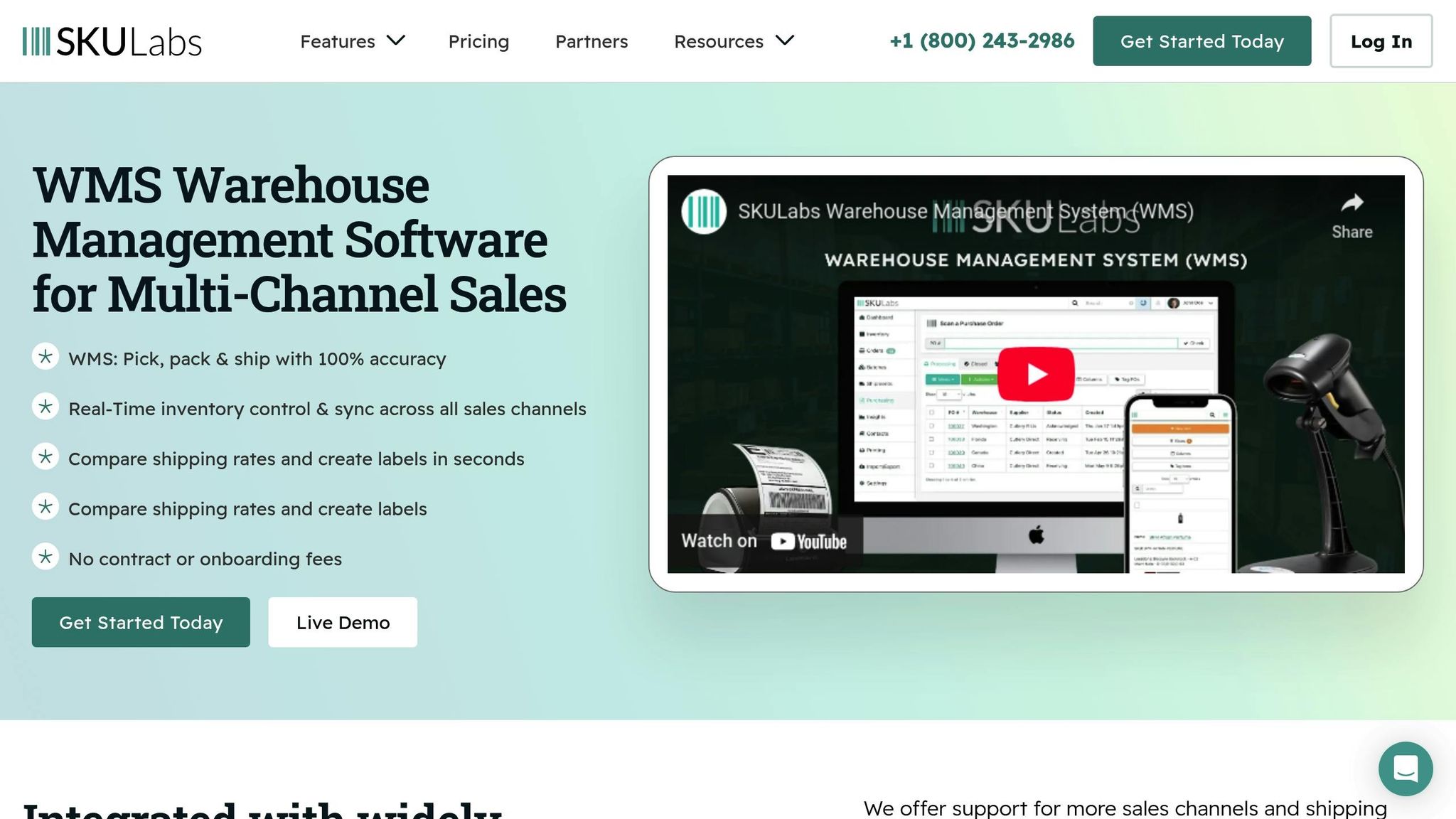
SKULabs is an inventory and order management platform designed for Shopify brands that operate across multiple stores. From managing purchase orders to streamlining warehouse operations, SKULabs caters to businesses with complex product lines and multi-channel requirements.
Multi-Store and Location Management
With SKULabs, you can oversee inventory across multiple Shopify stores and warehouses through one centralized dashboard. It’s equipped to handle intricate SKU catalogs, including bundles, kits, and multi-variant products, while offering precise location-based inventory controls.
Real-Time Inventory Updates
SKULabs ensures your inventory levels are updated instantly across Shopify and other sales channels like Amazon, eBay, and Walmart. This real-time syncing helps minimize overselling and inventory discrepancies.
Automation Tools
The platform automates key tasks like order routing, barcode scanning, pick/pack/ship workflows, and low-stock alerts. These features can save businesses up to 20 hours per week. It also supports batch tracking and manages products with expiration dates.
Purchase Order Management Made Simple
SKULabs includes built-in tools for creating, tracking, and receiving purchase orders directly through the platform. This feature not only simplifies supplier management but also ensures restocking is aligned with actual inventory levels.
Reporting and Analytics
Advanced reporting tools in SKULabs provide deep insights into inventory performance, sales trends, and fulfillment processes. These analytics help businesses make informed decisions, such as identifying slow-moving stock or improving efficiency. In fact, brands using SKULabs have reported up to a 30% drop in stockouts and fulfillment errors after implementing the platform.
Seamless Shopify Integration
SKULabs integrates directly with Shopify, syncing product, order, and inventory data effortlessly. Its barcode scanning capabilities and mobile-friendly tools make warehouse operations smoother and more efficient.
Pricing Details
Pricing starts at $299 per month for small to mid-sized businesses, with custom plans available for larger enterprises. While the initial setup can be challenging for businesses with very large catalogs, SKULabs offers dedicated support to guide users through the onboarding process.
sbb-itb-f0fc809
4. Prediko Inventory Management
At this time, detailed information about Prediko Inventory Management isn't readily available. For the most accurate and up-to-date insights on how Prediko handles intricate inventory tasks, it's best to consult the provider's official resources. Compared to the detailed breakdowns provided for other tools, the lack of accessible data on Prediko leaves some questions unanswered.
5. Syncio Multi Store Sync
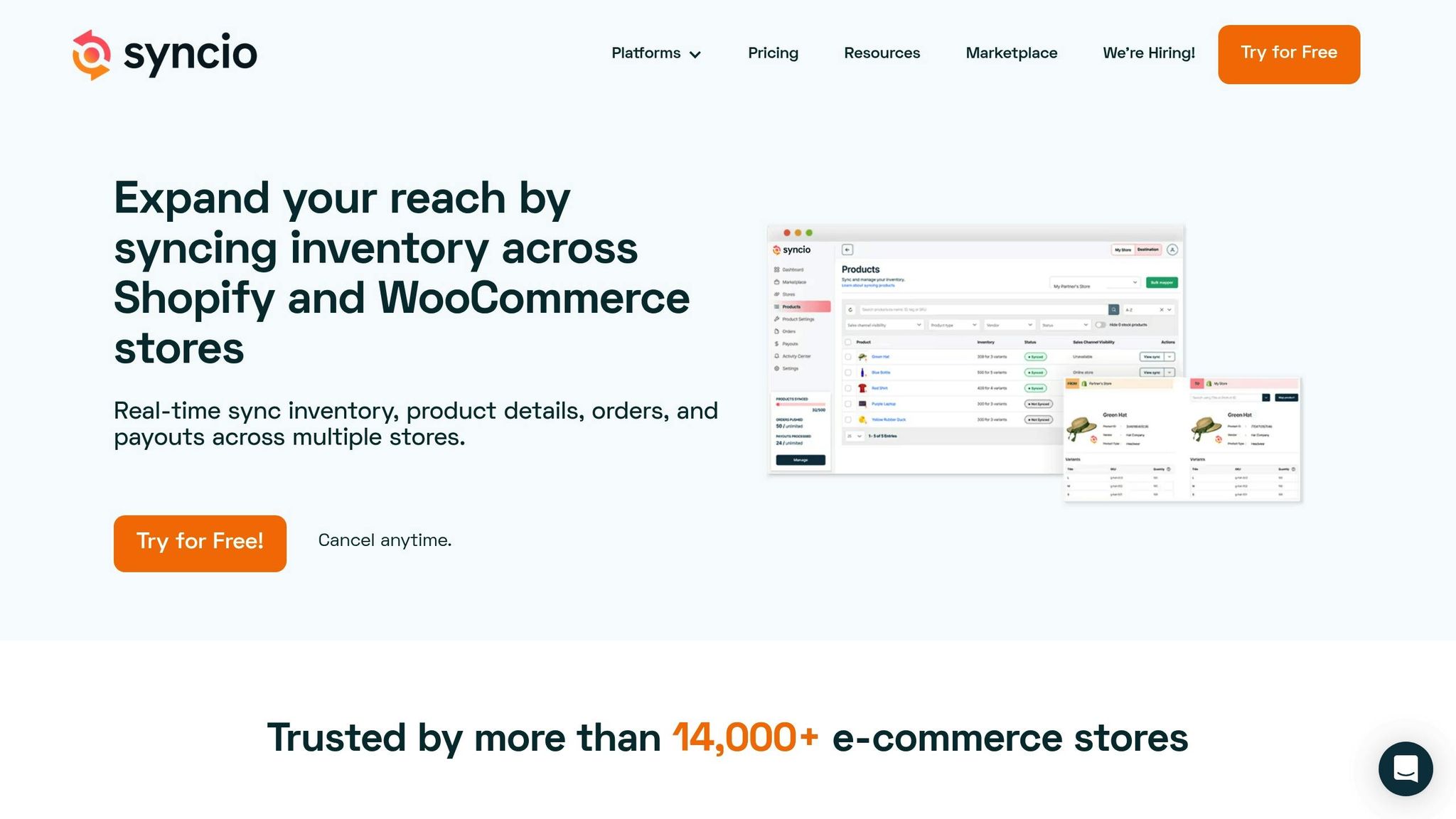
Syncio is designed to simplify inventory management across multiple Shopify stores by ensuring real-time synchronization, making stock management more efficient and reliable.
Multi-store/location support
Syncio streamlines inventory management by connecting multiple Shopify stores through a single, easy-to-use dashboard. As businesses grow and add new stores or locations, Syncio scales alongside them, making it easy to manage stock levels, product data, and order fulfillment from one centralized place. This eliminates the hassle of switching between individual store backends, ensuring smooth, real-time updates across all locations.
Real-time syncing
At the heart of Syncio's functionality is its real-time, two-way syncing feature. When a sale is made in one store, inventory levels are instantly updated across all connected stores. Likewise, restocking or product updates are reflected immediately, minimizing the risk of stock discrepancies or overselling. One U.S.-based merchant shared that Syncio helped them completely avoid the challenges of manual inventory syncing.
Automation features
Syncio takes care of repetitive tasks that would otherwise require manual effort. It automates the creation of new products across stores, syncs product details, and flags any SKU or barcode mismatches to alert users of potential issues. By reducing human error and cutting down on repetitive work, Syncio allows merchants to focus on more strategic, high-value activities.
Reporting & analytics
On top of its automation capabilities, Syncio provides detailed reports and activity logs that track inventory movements, product updates, and synchronization statuses. These tools make it easier to identify and resolve discrepancies, ensuring inventory data stays accurate. However, businesses requiring more advanced analytics may need to pair Syncio with additional reporting tools.
Ease of integration with Shopify
Syncio integrates directly with Shopify through the Shopify App Store, offering a straightforward setup process. Most users can get the system up and running within a few hours. While the initial configuration may pose some challenges for those less familiar with tech, Syncio provides 24/7 customer support to assist with onboarding and troubleshooting. This reliable integration makes it a valuable tool for simplifying multi-store operations.
Pricing structure
Syncio offers flexible, budget-friendly monthly pricing plans, catering to Shopify businesses of all sizes. New users can explore its features with a 7-day free trial before committing to a subscription. With its accessible pricing and dedicated support, Syncio presents an appealing solution for businesses looking to streamline their inventory management across multiple stores.
Tool Comparison Chart
Choosing the right inventory management tool for your multi-store Shopify setup can feel overwhelming, but comparing key features side by side helps narrow down the best option for your needs. Below is a detailed comparison of the top tools, building on the features discussed earlier.
| Tool | Multi-Store Support | Real-Time Syncing | Automation | Demand Forecasting | Purchase Order Management | Reporting & Analytics | Shopify Integration | Pricing (USD) |
|---|---|---|---|---|---|---|---|---|
| Forstock | Yes | Yes | Yes | Yes (AI-powered) | Yes (One-click POs) | Advanced inventory analytics | Seamless | $39/month |
| Multi-Store Sync Power | Yes | Yes (Two-way) | Yes | No | Limited | Detailed sync logs | Deep integration | $19–$49/month |
| SKULabs | Yes | Yes | Yes | Basic | Yes | Comprehensive | Multi-platform | ~$299/month |
| Prediko Inventory Management | Yes (Unlimited stores) | Yes | Yes | Yes (AI-powered) | Yes (Bulk editing) | Customizable (100+ filters) | Seamless | ~$49+/month |
| Syncio Multi Store Sync | Yes | Yes (Two-way) | Yes | No | Limited | Basic activity logs | Easy setup | Free & paid plans |
Key Takeaways from the Comparison
Pricing
The pricing structure varies significantly across platforms. Forstock offers a flat $39/month rate regardless of business size, from startups to large-scale brands generating $40M+ in revenue. In contrast, SKULabs operates at the higher end with a ~$299/month fee, reflecting its enterprise-level, multi-channel capabilities. Meanwhile, Multi-Store Sync Power’s tiered pricing ($19–$49/month) provides flexibility for smaller budgets, and Syncio offers both free and paid plans.
Automation and Forecasting
Forstock and Prediko lead the automation game with AI-powered demand forecasting. These tools analyze sales trends, seasonality, and lead times to provide smarter inventory planning. While other tools like Multi-Store Sync Power and Syncio focus on basic syncing, they lack advanced forecasting capabilities that save time and improve accuracy.
Purchase Order Management
Forstock and Prediko stand out with robust purchase order features. Forstock simplifies the process with one-click PO creation, while Prediko offers bulk editing for handling complex supplier coordination. On the other hand, tools like Syncio focus on inventory synchronization and do not include procurement features.
Reporting and Analytics
The depth of reporting varies greatly. Prediko shines with over 100 customizable filters and export options, making it ideal for data-driven decision-making. Forstock provides advanced analytics that track inventory health and supplier performance. Basic tools like Syncio, however, only offer activity logs, which may not meet the needs of brands seeking deeper insights.
Shopify Integration
All tools integrate with Shopify, but the quality of integration differs. Forstock and Prediko offer seamless Shopify connections with unified dashboards for easier management. Multi-Store Sync Power also provides strong Shopify integration, while SKULabs supports multiple e-commerce platforms, making it a better fit for businesses operating beyond Shopify.
Trial Periods
Most platforms provide trial periods to test their features. Forstock offers a 14-day trial, while Multi-Store Sync Power allows for a 7-day trial. These trials give brands a chance to evaluate how well the tools perform in their specific workflows before committing to a subscription.
In summary, Forstock offers a strong balance of affordability and advanced features, including AI-powered forecasting, automated purchase orders, and robust analytics - all at $39/month. This makes it a standout choice for multi-store Shopify brands looking for a capable yet cost-effective solution. Meanwhile, tools like SKULabs cater to enterprise-level needs at a premium price, and Syncio provides a simpler, budget-friendly option for basic inventory syncing.
Conclusion
Managing inventory across multiple Shopify stores doesn’t have to be a headache. With the right inventory management tool, even the most complex multi-location operations can become smooth, automated workflows that save time and reduce costly mistakes.
These tools help you track stock levels in real time, minimize manual errors, and provide analytics to make smarter purchasing decisions. For example, brands using AI-powered platforms like Prediko report saving up to three hours daily with features like automated forecasting and restocking alerts.
When choosing a solution, it’s essential to think about your specific needs. For smaller brands, ease of use and budget-friendly pricing might be top priorities. In contrast, fast-growing businesses may need advanced features like AI-driven forecasting or support for multiple warehouses. Consider factors like how many SKUs you manage, the number of store locations, integration capabilities, and your long-term growth plans.
Free trials are a great way to test out different tools and find one that fits your operational needs and workflow.
The right inventory management solution doesn’t just simplify operations - it reduces errors and frees up your time to focus on what truly matters: growing your business and serving your customers. With features like automated workflows, user-friendly dashboards, and data-driven insights, these tools can help you scale efficiently while staying agile and responsive to change. Choosing a tool that matches your current needs and grows alongside your business ensures your multi-store operations remain efficient and future-ready.
FAQs
What are the benefits of AI-powered forecasting for multi-store Shopify brands?
AI-powered forecasting empowers Shopify brands to make better inventory decisions by analyzing factors like sales trends, seasonal shifts, and lead times. This approach ensures that every purchasing decision is backed by data, helping to minimize the chances of overstocking or running out of stock.
By providing accurate demand forecasts, brands can simplify operations across multiple locations, improve cash flow, and keep inventory levels aligned with customer needs. Plus, automating routine tasks saves valuable time, giving merchants more freedom to focus on scaling their business.
What should I look for in an inventory management tool for my Shopify stores?
When choosing an inventory management tool for your Shopify store, focus on features that streamline your daily tasks and improve overall efficiency. For instance, real-time demand forecasting can help you anticipate sales trends, preventing both stockouts and overstocking. Tools that automate tasks like purchase order creation and reordering not only save time but also minimize the risk of human error.
A user-friendly dashboard is key for keeping everything in one place - stock levels, supplier performance, and order tracking - so you can make smarter, faster decisions. Make sure the tool integrates smoothly with Shopify to keep your inventory, orders, and product listings in sync without any hassle. Advanced options like AI-powered insights and centralized supplier management can further simplify your operations and set the stage for growth.
How do these inventory tools integrate with Shopify, and what benefits do they offer for daily operations?
Inventory tools work hand-in-hand with Shopify, creating a connected system that helps you manage stock levels, suppliers, and performance across various store locations. By bringing all this information into one place, these tools simplify your day-to-day tasks, like monitoring inventory and coordinating with suppliers.
With more efficient workflows, merchants can cut down on time spent on manual tasks, minimize mistakes, and use data to make smarter decisions about meeting customer demand. This integration keeps operations running smoothly, allowing brands to concentrate on growing their business without getting bogged down by inventory headaches.



.png)
.png)


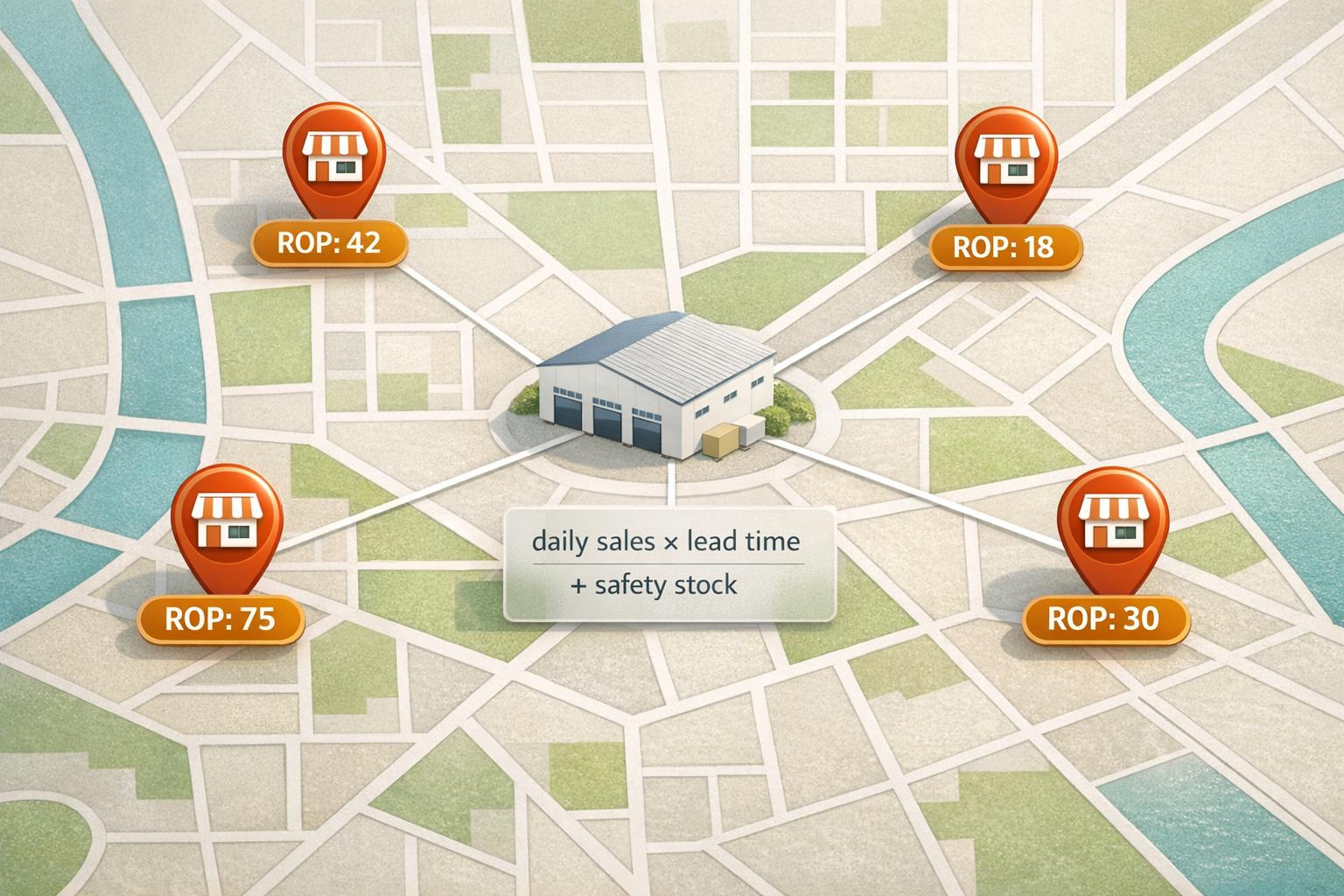
.png)
.png)
.png)
.svg)